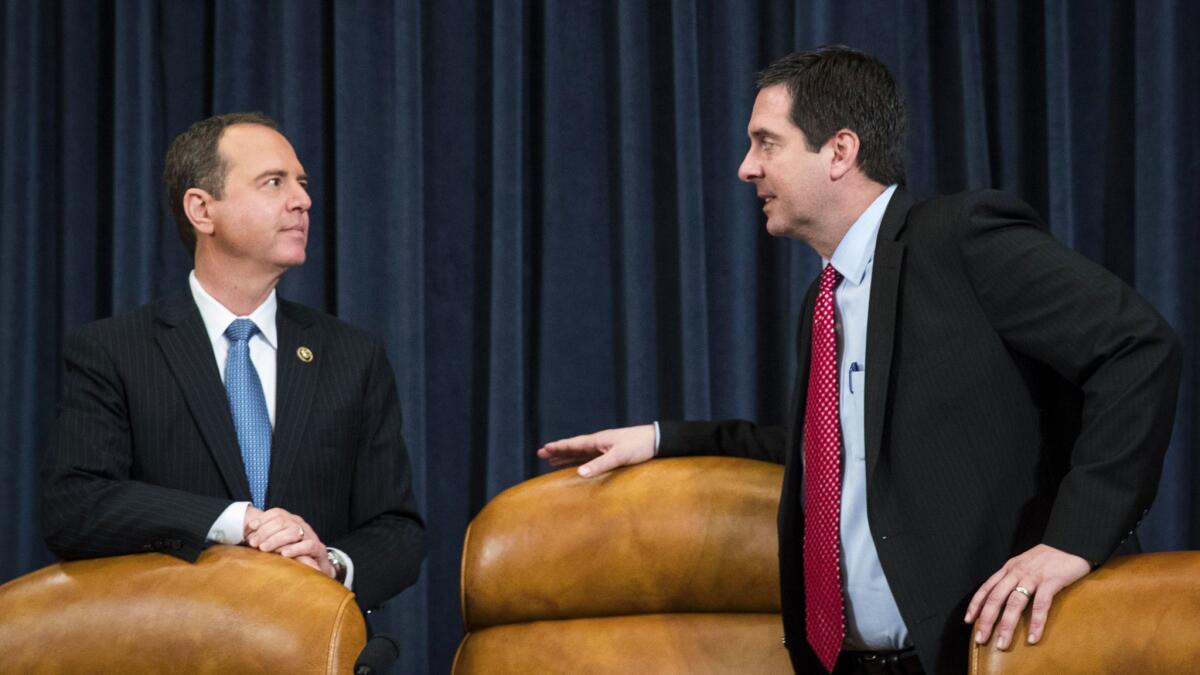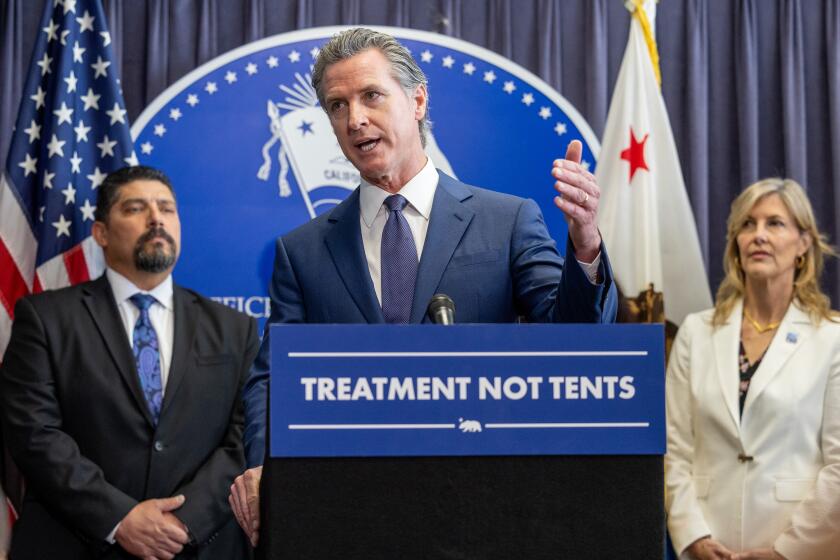Intelligence panel leaders try to avoid partisan rifts that sank other congressional inquiries

As Congress moved hesitantly in the last few months toward investigating Russia’s interference in the 2016 election, a question has loomed: Could lawmakers bridge their deep partisan divide sufficiently to produce an inquiry a broad range of Americans would accept?
In the House, the answer is largely in the hands of a pair of soft-spoken Californians: the chairman and ranking minority member of the House Permanent Select Committee on Intelligence, Devin Nunes, a Republican former dairy farmer from Tulare, and Adam B. Schiff, a Democratic former federal prosecutor from Burbank.
On Monday, the spotlight turned on them. The two have worked side by side on the committee for years without major disagreement, but for a panel that typically does much of its work behind closed doors, the hearing posed an unusual public test.
At the end of a long day of testimony that was, by congressional standards, sober-minded and at least partially bipartisan, it was a test they appeared to have survived.
The congressional inquiry remains in its early stage and could still end by collapsing into partisan stalemate. Schiff, who has warned he would loudly protest if he thought the investigation was being stymied, repeated his belief that “we would benefit from the work of an independent commission that … can be completely removed from any political considerations.”
For the opening day, however, the hearing provided significant testimony and relatively little of the high-volume theatrics that have limited the credibility of other recent congressional investigations.
“It is OK for Mr. Schiff and I to have disagreements,” Nunes said when the two held a news conference last week. “He represents a district, just like I do. We’re clearly from different political parties ... but we’re going to work together and we’re probably going to have a lot that we’re going to agree on. We may have some things we disagree on; we’ll try to get through those.”
Throughout the day, as the committee questioned FBI Director James B. Comey and Adm. Michael S. Rogers, the director of the National Security Agency, about Russian efforts to influence the presidential election, the two congressmen provided a contrasting picture.
Nunes, hunching his shoulders as he leaned his elbows on the dais, sometimes pursing his lips, appeared uncomfortably on defense.
Schiff, a vocal Hillary Clinton surrogate throughout the campaign, was on offense, focused on potential connections between President Trump’s campaign and Russia, at times bouncing in his seat as he questioned Comey and Rogers.
Although not an outspoken backer of Trump’s presidential bid, Nunes had been a member of the transition team. This year, he made statements that seemed to minimize the need for an investigation, saying repeatedly he’s seen no evidence of collusion between Russia and the Trump campaign.
On Monday, he set the pattern for his Republican colleagues, trying to shift the focus away from Trump to the issue of who had provided possibly classified information to reporters.
He pressed Comey and Rogers early to say who had access to information that has leaked to the news media in recent months and whether Russian interference had changed any votes. And he wrapped up the lengthy hearing by urging Comey to finish the FBI’s investigation quickly, saying it casts a “gray cloud” over the administration.
“I just don’t have any evidence of people within the White House or the administration have any ties to Russian intelligence services of any kind, and that even hanging out there is bad for democracy, bad for America, and clearly it helps our adversaries, especially the Russians,” he told reporters after the hearing.
But as Comey and Rogers debunked Trump’s tweets and publicly confirmed the existence of a counterintelligence investigation that is examining possible coordination between the Trump campaign and Russian officials, Nunes made no effort to shut down the questioning by Schiff and his Democratic colleagues.
Indeed, Nunes allowed Schiff an unusually long opening statement in which to lay out, like a prosecutor’s brief, the “circumstantial evidence” suggesting that such coordination may have taken place.
“Is it possible that all of these events and reports are completely unrelated and nothing more than an entirely unhappy coincidence? Yes, it is possible,” Schiff said.
“But it is also possible, maybe more than possible, that they are not coincidental, not disconnected and not unrelated, and that the Russians used the same techniques to corrupt U.S. persons that they have employed in Europe and elsewhere. We simply don’t know, not yet, and we owe it to the country to find out,” he said.
By contrast with other recent congressional hearings, such as the lengthy, at times boisterous examination of the Benghazi attacks, the two party leaders aimed no barbs at each other, staying polite even when disputing questions the other had asked.
At least for now, both parties have incentives to avoid a crash, said George Washington University political science professor Sarah Binder.
Republicans don’t have a big appetite to investigate an administration their party controls, she said, but they’re willing to perform the “delicate dance” of letting the investigation continue because a few Senate Republicans, notably John McCain of Arizona and Lindsey Graham of South Carolina, have indicated they’re open to an independent commission if their House colleagues won’t investigate.
To avoid that possibility, the GOP is “trying to find the lowest common denominator of bipartisanship,” she said.
Democrats, meantime, “have to keep this relationship constructive to keep Republicans on board.”
That comity could come under greater strain next week when the committee is scheduled to question former Director of National Intelligence James R. Clapper and former CIA Director John Brennan. Republicans probably will press both men about whether they were involved in leaking any information about the investigation.
Schiff noted the fine line the committee will have to walk.
“The question most people have is whether we can really conduct this investigation in the kind of thorough and nonpartisan manner that the seriousness of the issues merit, or whether the enormous political consequences of our work will make that impossible,” he said in his opening statement.
“It would be a tremendous public service and one that is very much in the national interest” if they can, he said. “The truth is, I don’t know the answer.”
As the hearing ended, one of the committee’s Republican members, Rep. Will Hurd of Texas, said the panel needs to find a way for the answer to be yes.
“We must. The American people demand this, the future of our democratic institutions demand it,” Hurd said.
Follow @sarahdwire on Twitter
Read more about the 55 members of California’s delegation at latimes.com/politics
ALSO:
Five takeaways from a historic hearing into Russian meddling in the U.S. election
FBI director confirms investigation of possible collusion between Trump campaign and Russia
Updates on California politics
More to Read
Get the L.A. Times Politics newsletter
Deeply reported insights into legislation, politics and policy from Sacramento, Washington and beyond. In your inbox three times per week.
You may occasionally receive promotional content from the Los Angeles Times.







